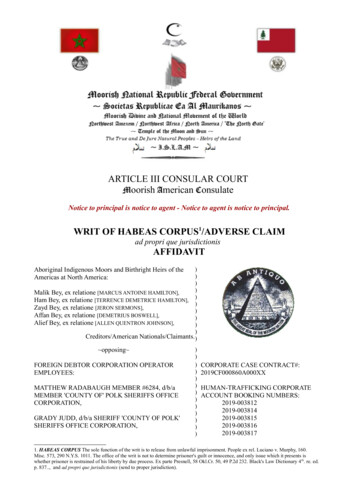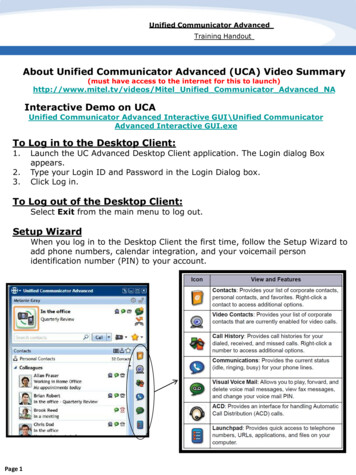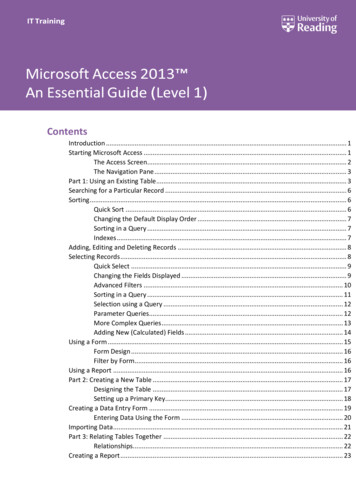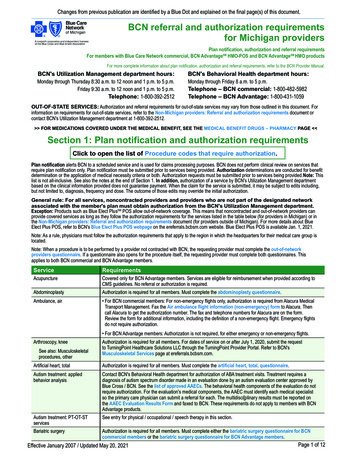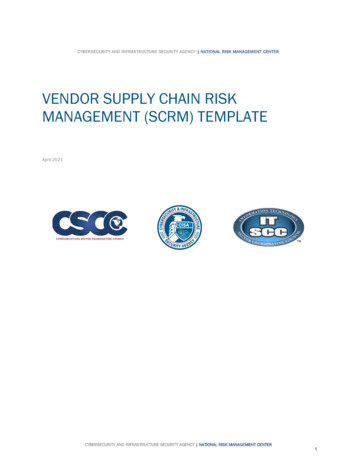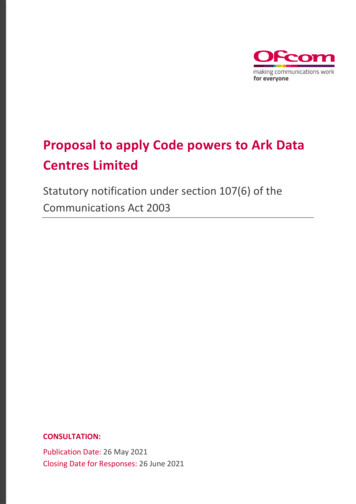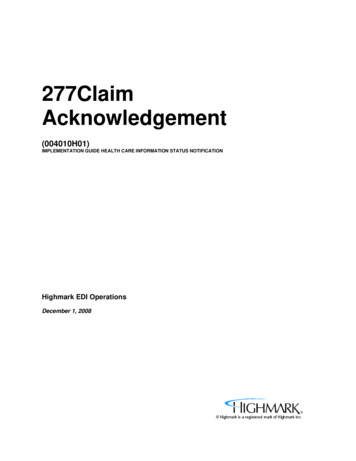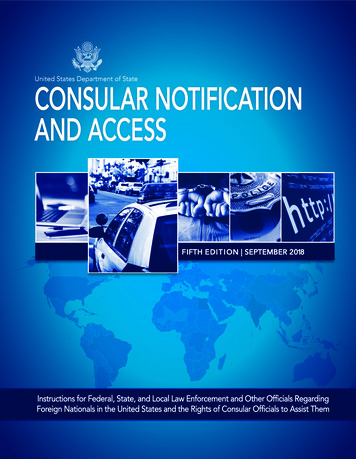
Transcription
BASIC INSTRUCTIONSUnited States Department of StateCONSULAR NOTIFICATIONAND ACCESSFIFTH E DI T I ON SEPTEMBER 2018Instructions for Federal, State, and Local Law Enforcement and Other Officials RegardingForeign Nationals in the United States and the Rights of Consular Officials to Assist 1ThemCONSULARNOTIFICATIONAND ACCESS
DEPARTMENT OF STATE PUBLICATIONOffice of the Legal Adviser and Bureau of Consular AffairsRevised September 2018
ABOUT THIS MANUALThis manual contains instructions and guidance relating to the obligations of federal, state, andlocal government officials to provide information to foreign consular officers and to permit foreignconsular officers to assist their nationals in the United States. It focuses on the obligations ofconsular notification and access that pertain to the arrest and detention of foreign nationals;the appointment of guardians for minor and adult foreign nationals; deaths and serious injuriesof foreign nationals; and wrecks or crashes of foreign ships or aircraft on U.S. territory. It alsoaddresses related issues pertaining to the provision of consular services by foreign consularofficers to their nationals in the United States. The instructions and guidance in this manualpertain to all foreign nationals in the United States, regardless of their legal status.This manual is designed to help ensure that foreign governments can extend appropriateconsular services to their nationals in the United States and that the United States complies withits legal obligations to such governments. These legal obligations arise primarily from treaties,which form part of the supreme law of the land under Article VI of the U.S. Constitution. Theinstructions and guidance contained in this manual must be followed by all federal, state, andlocal government officials, whether law enforcement, judicial, or other, insofar as they pertain toforeign nationals subject to the officials’ authority or to matters within the officials’ competence.Compliance with these instructions and guidance will also help ensure that the United Statescan insist upon rigorous compliance by foreign governments with respect to U.S. nationalsabroad, and will help prevent both international and domestic litigation. The Department of Stateappreciates the assistance of all federal, state, and local government officials in helping toachieve these objectives.If you have any questions not addressed in this manual, write or call:Consular Notification & Access (CNA)U.S. Department of StateCA/PSA-17, 12th FloorWashington, DC 20522-1712Telephone: (202) 485-7703Email: consnot@state.govWebsite: travel.state.gov/CNAFor urgent telephone inquiries outside normal business hours, you may call the Department ofState Operations Center at (202) 647-1512.iCONSULARNOTIFICATIONAND ACCESS
The text of this manual, which the Department of State updates periodically, is also available attravel.state.gov/CNA, along with the most up-to-date contact information for foreign embassiesand consulates within the United States and other reference materials. All Department of Statereference materials on this subject matter are available free of charge to U.S. law enforcementand other government officials. The Department also offers free training seminars on consularnotification and access throughout the United States. Please visit the website listed above forfurther information and to request training.Additional requirements must be followed in cases pertaining to foreign diplomatic and consularofficers and their families. For information on the treatment of such individuals, including incases of arrests, call the Department of State’s Office of Protocol at (202) 647-1985. After hours,you may call the Protective Liaison Division of the Department of State’s Bureau of DiplomaticSecurity at (571) 345-3146 or (866) 217-2089, or send a fax to (202) 895-3613. Further informationabout diplomatic and consular immunity can be found at NOTIFICATIONAND ACCESS
TABLE OF CONTENTSPART 1 BASIC INSTRUCTIONS 1Summary of Requirements Pertaining to Foreign NationalsSteps to Follow When a Foreign National Is Arrested or DetainedMandatory Notification CountriesFlow Chart of Arrest or Detention Notification Procedures2345PART 2 DETAILED INSTRUCTIONS ON THE TREATMENT OFFOREIGN NATIONALS 6Arrests and Detentions of Foreign Nationals7Notification Required at the Foreign National’s Request: The General Rule7Mandatory Notification: The Special Rule7Recordkeeping8Consular Access to Detained Foreign Nationals9Deaths, Serious Injuries, and Serious Illnesses of Foreign Nationals9Appointments of Guardians or Trustees for Foreign Nationals10Accidents Involving Foreign Ships or Aircraft10PART 3 FREQUENTLY ASKED QUESTIONS 11Consular Officers11What is a “consular officer”?11What is a “consul”? What is a “consular official”?11How is a consular officer different from legal “counsel”?11What is an “honorary consul”?11How are diplomatic officers different from consular officers?11Should I treat a diplomatic officer the same as a consular officer?11How can I be sure that someone who claims to be a consular officer, a consul, an honoraryconsul, or a diplomatic officer is in fact one?12Foreign Nationals12Who is a “foreign national”?12Is a foreign national the same as an “alien”?12Are “citizenship” and “nationality” the same thing?12Is a person with a “green card” (a “lawful permanent resident”) considered a foreign national? 12But since “green card” holders are living in the United States permanently, why can’t I ignoreconsular notification requirements for them? Are the rules different for Polish Nationals?12Do I have to ask everyone I arrest or detain whether he or she is a foreign national?12Short of asking all detainees about their nationality, how might I know thatsomeone is a foreign national?13Are foreign nationals required to carry identity documents that indicate their nationality?13Do consular notification procedures have to be followed if I can’t verify a detainee’s nationalitythrough documentation?13Should I ask persons I arrest whether they are in the United States legally?13Should I treat undocumented and “illegal” aliens differently than aliens lawfullypresent in the United States?13iiiWhat about dual nationals?14CONSULARNOTIFICATIONAND ACCESS
TABLE OF CONTENTSWhich Officials Are Responsible for Providing Consular Notification toForeign Consular Officers14Who is actually responsible for making the necessary notifications to the individualor the consular officer?14Who is responsible for notifying the consular officers of arrests and detentions? 14What is the responsibility of prosecutors for notifying consular officers of arrestsand detentions?15What is the responsibility of judicial officials for notification of arrests and detentions?15Who is responsible for notifying consular officers of deaths?16Who is responsible for notifying consular officers of a serious injury or illness? 16Who is responsible for notifying consular officers of appointments of guardians? 16Who is responsible for notifying consular officers of shipwrecks and aircraft crashes?16Why are state and local government officials expected to provide such notification?16Circumstances in Which Consular Notification Requirements Apply16What kinds of detentions create consular notification obligations?16Do I have to inform and notify even when the detention is only while a traffic citation iswritten, or for a similar brief time?17Should I notify the consulate any time I detain a foreign national who is a minor? 17What if the minor is unaccompanied and I am unable to locate the parent or guardian?17If I have a foreign national who is hospitalized or quarantined, do I have to provideconsular notification?18What about consular notification for adults who are mentally incompetent or lackingfull capacity?18Are civil commitments of foreign nationals covered by consular notification requirements?18Are foreign nationals in immigration detention covered by the consularnotification requirement?19If I am a prison official taking custody of a foreign national long after his or herinitial arrest or detention, do I have to inform the foreign national that he or shemay have his or her consular officers notified, and to notify such officials whererequested or where the national is from a list country?19If I am a prison official taking custody of a foreign national who is being transferred to myprison from a different prison, do I have to go through consular notification procedures?19Do I have to go through consular notification procedures if an alreadydetained foreign national is charged with a new offense?19Do I have to go through consular notification procedures upon the release or paroleof an incarcerated foreign national?20Do I have to go through consular notification procedures if I am taking a foreignnational into custody for a parole violation (e.g., on a parole retake warrant)and he or she was given consular information when originally arrested or detained?20Do I have to inform a foreign national that he or she may have his or herconsular officers notified even if I give him or her the Miranda warning?20ivCONSULARNOTIFICATIONAND ACCESS
TABLE OF CONTENTSIf law enforcement officials of the foreign national’s government are helpingwith our investigation, should I still go through the process of notifyingconsular officers?20Are there any circumstances in which I may comply with consular notificationrequirements by notifying someone other than the consular official withresponsibility for my geographic area?21How Quickly You Must Give Consular Information to the Foreign National21How quickly do I need to inform the foreign national of the option to have his orher consular officers notified of the arrest or detention?21Do I have to inform a foreign national of the option to have his or her consularofficers notified of the arrest or detention at the same time that I give theMiranda warnings?22If I inform a foreign national of the option to have his or her consular officersnotified of the arrest or detention at the same time I give the Miranda warnings,can I be sure of complying with notification requirements?22Manner in Which You Must Give Consular Information to the Foreign National22Does the foreign national have to be informed in writing about the option to havehis or her consular officers notified of the arrest or detention?22Does the foreign national have to be informed in his or her own language?23How do I figure out what country the foreign national is from, so that I know whichconsulate to notify? What if the national’s passport is from a country that no longer exists?23What about British nationals?23What if I can’t communicate with the foreign national? Can I notify consular officersregardless of what the foreign national’s wishes may be?24How Quickly You Must Notify the Consular Officers of Their National’s Arrestor Detention25In a Vienna Convention on Consular Relations (“non-list country”) arrestor detention case, if the foreign national requests that consular officers be notified,how quickly do I have to do so?25In a “mandatory notification” (“list”) country arrest or detention case, how quickly mustthe notification be provided to consular officers?25Manner in Which You Must Notify the Consular Officers of Their National’s Arrestor Detention26Can I agree to specific requests by particular consular officers to notify them of arrestsor detentions that I am not required to tell them about?26Can I simplify the process by notifying consular officers of all arrests or detentions,regardless of the foreign national’s wishes, instead of worrying about which countries are“mandatory” (“list”) and which are not mandatory?26Are there any particular countries that we know want to be notified of arrests anddetentions even in cases where I am not required to give notification?26vCONSULARNOTIFICATIONAND ACCESS
TABLE OF CONTENTSWhy doesn’t the Department of State encourage me to notify the consular officers ofthe arrest or detention in all cases, regardless of whether the foreign national wantsme to notify them? Wouldn’t that be simpler?26Isn’t it wrong to follow “mandatory notification” procedures for list countries if the foreignnational doesn’t want his or her consular officers notified? What about the foreign national’sprivacy interests? What if the foreign national is afraid of his or her own government?27If the foreign national is from a “mandatory notification” (“list”) country and I notify the consularofficers as required, should I tell the foreign national?27Can I comply with consular notification requirements by simply letting the detained foreignnational have access to a telephone?27My detention facility only allows inmates to make collect calls when calling outside of the localarea. What should I do if a consulate refuses to accept a collect call from a foreign nationalinmate? Do I have to allow the foreign national to call the consulate directly? 27When I notify the consular officers, should I tell them the reasons for the detention?28Is there a guiding principle I can follow in applying the consular notification requirements?28What Happens if You Failed to Notify29If I failed to go through consular notification procedures when I should have and theforeign national is still in detention, what should I do?29If I failed to go through consular notification procedures but the foreign national isnow receiving consular assistance, should I still notify the foreign consular officersof the arrest or detention?29If I failed to go through consular notification procedures and the foreign national hasalready been released from detention, should I still go through the process ofnotification?29What remedy might the foreign national or his or her country have if I failed to go throughconsular notification procedures?29How Consular Officers Will Provide Consular Access and Assistance30What can I expect a consular officer to do once notification of an arrest or detentionhas been made?30Are consular officers obligated to provide assistance to their nationals?31Can I rely on the consular officer to arrange for legal counsel?31Is a consular officer entitled to act as legal counsel for a detained foreign national?31Are a consular officer’s communications with a detained foreign national privileged inthe same way communications with lawyers are privileged? Can the consular officertake actions contrary to the foreign national’s interests?31Do I have to permit a consular officer to have access to a detainee?31Do I have to allow access by employees of the consulate who are not consular officers?32Do special rules apply if I detain an Iranian national?32Are consular officers entitled to visit whenever they want to?32Do consular officers have to comply with prison security regulations?32Is a consular officer entitled to meet or converse privately with a detained foreign national?33What is the role of a consular officer in a case involving the death of a foreign national?33Do I have to notify consular officers if a foreign national is seriously injured or ill? 34viCONSULARNOTIFICATIONAND ACCESS
TABLE OF CONTENTSWhat is the role of a consular officer in a case involving the appointment of a guardian?34Are consular officers entitled to receive copies of a foreign national’s medicalrecords in cases involving the death of a foreign national or the possible appointmentof a guardian for a minor or incapacitated foreign national?35Is there a guiding principle I can follow with respect to consular access and dealingwith consular officers?35Contacting the Department of State35Do I need to notify the Department of State whenever I arrest or detain a foreign national?35How can I get answers to other questions?35PART 4 LEGAL OVERVIEW37Vienna Convention on Consular Relations (VCCR)37VCCR Article 538VCCR Article 3639VCCR Article 3740Bilateral Agreements40Components of Table A through D41Customary International Law43Basis for Implementation44Table A: Provisions from Bilateral Agreements Requiring Mandatory Notification45Table B: Provisions from Bilateral Agreements Requiring Notification upon Request 51Table C: Consular Agreement and Convention Status of All Countries53Table D: Countries with Bilateral Agreements Containing Provisions onConsular Notification and Access67PART 5 SUGGESTED STATEMENTS TO DETAINED FOREIGN NATIONALSNOTIFICATION FAX SHEETS, AND CONSULAR IDENTIFICATION CARDS 71English73Arabic74Burmese75Cambodian (Khmer)76Chinese77Chinese (Traditional)78Creole79Farsi LARNOTIFICATIONAND ACCESS
TABLE OF mali95Spanish96Swahili97Tagalog (Philippines)98Thai99Vietnamese100Fax Sheet for Notifying Consular Officers of Arrests or Detentions101Fax Sheet for Notifying Consular Officers of the Possible Appointment of a Guardianor Trustee for a Foreign National102Fax Sheet for Notifying Consular Officers of the Death, Serious Injury, or Illnessof a Foreign National103Diplomatic and Consular Identification Cards104PART 6 MODEL STANDARD OPERATING PROCEDURE 108PART 7 CONTACT INFORMATION FOR FOREIGN EMBASSIES ANDCONSULATES IN THE UNITED STATES 114INDEXviiiCONSULARNOTIFICATIONAND ACCESS115
BASIC INSTRUCTIONSPART ONE: BASIC INSTRUCTIONSThe following pages summarize the basic requirements regarding consular notification andaccess. They are designed to be distributed or posted as readily accessible instructionsor notices to all federal, state, and local officials who may have contact with a foreignnational in a situation triggering a requirement to notify the foreign national’s consularofficers.These basic instructions and implementation tools, which may be freely photocopied andposted as notices, include:u Summary of Requirements Pertaining to Foreign Nationalsu Steps to Follow When a Foreign National Is Arrested or Detainedu “Mandatory Notification” (“List”) Countriesu Flow Chart of Arrest or Detention Notification Procedures1CONSULARNOTIFICATIONAND ACCESS
BASIC INSTRUCTIONSSUMMARY OF REQUIREMENTS PERTAINING TO FOREIGN NATIONALSuW hen foreign nationals from most countries are arrested or detained, theymay, upon request, have their consular officers notified without delay of theirarrest or detention, and may have their communications to their consularofficers forwarded without delay. In addition, foreign nationals must beadvised of this information without delay.u For foreign nationals of some countries, consular officers must be notified ofthe arrest or detention of a foreign national even if the foreign national doesnot request or want notification.u Consular officers are entitled to communicate with and to have access to theirnationals in detention, and to provide consular assistance to them, includingarranging for legal representation.u When a law enforcement or other government official becomes aware of thedeath, serious injury, or serious illness of a foreign national, consular officersmust be notified.u When a guardianship or trusteeship is being considered with respect to aforeign national who is a minor or an incompetent adult, consular officersmust be notified.u When a foreign ship wrecks or a foreign aircraft crashes in U.S. territory,consular officers must be notified.These are mutual obligations that also apply to foreign authorities when theyarrest or detain U.S. citizens abroad. In general, you should treat a foreignnational as you would want a U.S. citizen to be treated in a similar situation in aforeign country. This means prompt and courteous compliance with the aboverequirements.2CONSULARNOTIFICATIONAND ACCESS
BASIC INSTRUCTIONSSTEPS TO FOLLOW WHEN A FOREIGN NATIONAL IS ARRESTED OR DETAINED1. DETERMINE THE FOREIGN NATIONAL’S COUNTRY OF NATIONALITY. IN THE ABSENCE OFOTHER INFORMATION, ASSUME THIS IS THE COUNTRY ON WHOSE PASSPORT OR OTHERTRAVEL DOCUMENT THE FOREIGN NATIONAL IS TRAVELING.2. IF THE FOREIGN NATIONAL’S COUNTRY IS NOT ON THE LIST OF “MANDATORYNOTIFICATION” (“LIST”) COUNTRIES AND JURISDICTIONS (SEE PAGE 4 FOR THE LIST):uInform the foreign national, without delay, that he or she may have his or her consularofficers notified of the arrest or detention and may communicate with them. For a suggestedstatement in several different languages, see Part Five on pages 71 through 100 of thismanual.uIf the foreign national requests that his or her consular officers be notified, notify thenearest embassy or consulate of the foreign national’s country without delay. Foreignembassy and consulate phone numbers, fax numbers and email addresses can be foundon the Department of State’s web site at travel.state.gov/CNA. A suggested notification faxsheet appears on page 101.uForward any communication from the foreign national to his or her consular officers withoutdelay.3. IF THE FOREIGN NATIONAL’S COUNTRY IS ON THE LIST OF “MANDATORY NOTIFICATION”(“LIST”) COUNTRIES:u otify that country’s nearest embassy or consulate, without delay, of the arrest or detention.NPhone numbers, fax numbers and email addresses can be found on the Department ofState’s web site at travel.state.gov/CNA. You may use the suggested fax sheet on page101 for making the notification.u Tell the foreign national that you are making this notification and inform him or her, withoutdelay, that he or she may communicate with his or her consular officers. A suggestedstatement to the foreign national in several different languages appears in Part Five onpages 71 through 100 of this manual.uF orward any communication from the foreign national to his or her consular officers withoutdelay.4. KEEP A WRITTEN RECORD OF:u What information you provided to the foreign national and when.uT he foreign national’s requests, if any.uW hether you notified consular officers and, if so, the date and time of notification and themeans you used to notify them (e.g., fax, phone or email). If you used fax to notify theconsular officers, you should keep the fax confirmation sheet in your records. If you usedemail to notify the consular officers, you should retain the sent email in your records.u Any other relevant actions taken.3CONSULARNOTIFICATIONAND ACCESS
BASIC INSTRUCTIONSMANDATORY NOTIFICATION COUNTRIES (“LIST” COUNTRIES)AlbaniaAlgeriaAntigua and zeBruneiBulgariaChina (including Macao andHong Kong)1Costa RicaCyprusCzech nd2RomaniaRussiaSaint Kitts and NevisSaint LuciaSaint Vincent and theGrenadinesSeychellesSierra dad and TobagoTunisiaTurkmenistanTuvaluUkraineUnited Kingdom3UzbekistanZambiaZimbabweNotification is not mandatory in the case of persons who carry “Republic of China” passports issued by Taiwan. Such persons should beinformed without delay that the nearest office of the Taipei Economic and Cultural Representative Office (“TECRO”), the unofficial entityrepresenting Taiwan’s interests in the United States, can be notified at their request. See also footnote 129 on page 64.2Mandatory only for foreign nationals who are not lawful permanent residents in the United States (i.e., “green card” holders). Otherwise,upon the national’s request. See the question “But since ‘green card’ holders are living in the United States permanently, why can’t Iignore consular notification requirements for them?” at page 12; see also footnote 18 on page 41.3The bilateral consular convention between the United States and the United Kingdom applies to British nationals from Great Britain(England, Wales, and Scotland); Northern Ireland; the Crown Dependencies of Jersey, Guernsey, and the Isle of Man; and the BritishOverseas Territories, including Anguilla, Bermuda, the British Virgin Islands, the Cayman Islands, Gibraltar, Montserrat, and the Turksand Caicos Islands, along with other island territories. Residents of the Overseas Territories may be traveling on a passport issued bythe territory with no indication that the territory is British. Nevertheless, for them and all others from a British possession listed above,consular notification and access should be provided to the nearest U.K. consulate. For advice on how to ascertain whether an arrestedor detained person is a British national, as well as a complete list of the Overseas Territories, see the question “What about Britishnationals” on page 23. For the U.S.–U.K. convention, see footnote 30 on page 45.14CONSULARNOTIFICATIONAND ACCESS
BASIC INSTRUCTIONSARRESTING A NON-U.S. CITIZENConsular Notification ProcessQ.A.Are you a U.S. citizen?“YES, I am a U.S. citizen.”(No further action required.)Q.“NO, I am not a U.S. citizen.“Are you a national of one of these countries?AlbaniaAlgeriaAntigua and zeBruneiBulgariaChina 1Costa RicaCyprusCzech nd 2Romania1. Includes Hong Kong and Macao. Does not include Republicof China (Taiwan).2. Mandatory only for non-permanent residents in the UnitedStates (i.e., those not holding a “green card”); for green cardholders, notification is upon request.A.NEXTSTOPRussiaSt. Kitts and NevisSt. LuciaSt. Vincent and the GrenadinesSeychellesSierra dad and TobagoTunisiaTurkmenistanTuvaluUkraineUnited Kingdom 3UzbekistanZambiaZimbabwe3. UK includes Anguilla, British Virgin Islands, Bermuda,Montserrat, and the Turks and Caicos islands. Residents’passports bear the name of their territory and may also bearthe name “United Kingdom.” Whether or not the passportbears the name “United Kingdom,” consular services forthese persons are provided by UK consulates.“YES.““NO.“Step 1. Inform detainee that he or she maycommunicate with consulate, and that you mustnotify consulate of arrest/detention.Inform detainee, without delay, that he or shemay have consulate notified of arrest/detention.Step 2. Notify nearest consulate without delay.Do not inform consulateabout detainee’s refugee orasylum status.Detainee may communicatewith consular officer andmay request consular accessat any time (whetherpreviously declined or not).Consular officers may haveaccess to detaineeregardless of whetherdetainee requests it. Even ifdetainee does not want tobe visited, consular officersmay still have oneface-to-face visit.Consular Notification & Access (CNA)U.S. Department of StateCA/PSA-17, 12th FloorWashington, DC 20522-1712Step 3. Make record of notification in case file.Where fax or email sent, keep fax confirmation orsent email.Step 4. Allow consular officers access to detaineeif they subsequently request access.(No further action required.)IN ALL CASES:NEXTSTOPQ.Do you want your consulate notified of your arrest/detention?A.“YES.“P: 202-485-7703consnot@state.gov“NO.“Step 1. Make note in case file.Step 1. Make note in case file.Step 2. Notify nearest consulate without delay.Step 2. Do NOT inform the consulate.Step 3. Make record of notification in case file.Where fax or email sent, keep fax confirmation orsent email.5Step 4. Allow consular officers access to detaineeif they subsequently request access.(No further action required.)STOP(No further action required.)For more information visit: travel.state.gov/CNASTOPCONSULARNOTIFICATIONAND ACCESS
DETAILED INSTRUCTIONSPART TWO:DETAILED INSTRUCTIONS ON THETREATMENT OF FOREIGN NATIONALSIf you are a federal, state, or local lawenforcement, judicial, or other governmentofficial, you should follow the instructionsin this manual whenever you are takingofficial actions relating to a foreign national.These instructions pertain to: (1) the arrestand detention of foreign nationals; (2) theappointment of guardians for foreign nationalswho are minors or incompetent adults;(3) deaths of or serious injuries to foreignnationals in the United States; and (4) crashesof foreign aircraft or wrecks of foreign ships inU.S. territory. These instructions also addressissues pertaining to the provision of consularservices by foreign consular officers to foreignnationals in the United States. They areintended to ensure that foreign governmentscan extend appropriate consular services totheir nationals in the United States and thatthe United States complies with its legalobligations to such governments.The instructions in this manual are basedon international legal obligations designedto ensure that governments can assist theirnationals who live and travel abroad. Whilethese obligations are in part matters ofcustomary international law, most of them areset forth in the 1963 Vienna Convention onConsular Relations (VCCR), a multilateraltreaty to which the United States andmore than 170 other countries are party.Other obligations are contained in bilateralagreements (sometimes called “conventions”or “treaties”). These are legally bindingagreements between the United Statesand one other country. Treaties such asthe VCCR and other consular conventionsare binding on federal, state, and localgovernment officials to the extent they pertainto matters within such officials’ competenceas a matter of international law and the U.S.Constitution. See U.S. Const., art. VI, cl. 26CONSULARNOTIFICATIONAND ACCESS(“all Treaties made . . . shall be the supremelaw of the land”).These instructions focus primarily on providingconsular notification and access with respectto foreign nationals arrested or detained inthe United States, so that their governmentscan assist them. The obligations of consularnotification and access apply to U.S. citizensin foreign countries just as they apply toforeign nation
consular notification and access that pertain to the arrest and detention of foreign nationals; . This manual is designed to help ensure that foreign governments can extend appropriate . The Department also o


